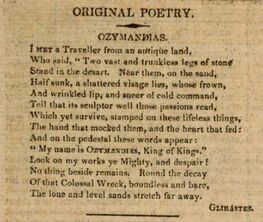Literature:Ozymandias: Difference between revisions
(→Ayeri) |
No edit summary |
||
| Line 1: | Line 1: | ||
{{Library translation sidebar}} | {{Library translation sidebar}} | ||
{{library ombox|'''''Ozymandias''''' is a poem by [[w:Percy Bysshe Shelley|Percy Bysshe Shelley]] published under the pseudonym Glirastes in 1818.}} | |||
[[File:Ozymandias.jpg|thumb|263px|The poem as first published in The Examiner.]] | |||
==Source== | |||
;English | |||
== | |||
<center> | <center> | ||
<poem> | <poem> | ||
| Line 24: | Line 23: | ||
</poem> | </poem> | ||
</center> | </center> | ||
===References=== | |||
* [[w:Percy Bysshe Shelley|Shelley, Percy Bysshe "Glirastes"]] (11 January 1818). [https://babel.hathitrust.org/cgi/pt?id=inu.30000093206054&view=1up&seq=36&size=125 "Ozymandias"]. ''[[w:The Examiner (1808–1886)|The Examiner]]''. No. 524. London. p. 24 – via [[w:HathiTrust|HathiTrust]]. | * [[w:Percy Bysshe Shelley|Shelley, Percy Bysshe "Glirastes"]] (11 January 1818). [https://babel.hathitrust.org/cgi/pt?id=inu.30000093206054&view=1up&seq=36&size=125 "Ozymandias"]. ''[[w:The Examiner (1808–1886)|The Examiner]]''. No. 524. London. p. 24 – via [[w:HathiTrust|HathiTrust]]. | ||
=Translations= | |||
{{Text translation widget}} | |||
[[Category:Songs and poems]] | |||
[[Category:Translation exercises]] | |||
== Ayeri == | == Ayeri == | ||
{{Contains Ayeri|page|pos= | {{Contains Ayeri|page|pos=right}} | ||
{ | {| border="0" cellspacing="0" cellpadding="5" align="center" | ||
|- style="vertical-align: top;" border="0" cellspacing="20" cellpadding="0" align="center" | |||
<poem | |<poem class="Ayer" language="qay"> | ||
s peNlYNF Asno similen tdo,ANF | s peNlYNF Asno similen tdo,ANF | ||
nry:nmaaNF smF kaaroY nj trYMkj | nry:nmaaNF smF kaaroY nj trYMkj | ||
| Line 46: | Line 52: | ||
AhlF/nm kebj,pFrj,soy,litoy kjvj, | AhlF/nm kebj,pFrj,soy,litoy kjvj, | ||
midj nerFnnYee_a Ed/kiynen nke. | midj nerFnnYee_a Ed/kiynen nke. | ||
</poem> | |||
| | |||
<poem | <poem> | ||
Sa pengalyang asano similena tado, ang | Sa pengalyang asano similena tado, ang | ||
| Line 65: | Line 71: | ||
ahal-nama kebay, pray, soya, litoya kayvay, | ahal-nama kebay, pray, soya, litoya kayvay, | ||
miday nernanyēa eda-kiyanena nake. | miday nernanyēa eda-kiyanena nake. | ||
</poem> | |||
|} | |||
Revision as of 18:54, 15 April 2024
 |
| Songs & poems |
|---|
| Stories & legends |
| Fables & declarations |
| Religious texts |
| Word-list templates |
|
| Relays |
|
Starlings' Song |
| Library portal |
|
|
|
Source
- English
I met a traveller from an antique land,
Who said, “Two vast and trunkless legs of stone
Stand in the desert. Near them, on the sand,
Half sunk, a shattered visage lies, whose frown,
And wrinkled lip, and sneer of cold command,
Tell that its sculptor well those passions read,
Which yet survive, stamped on these lifeless things,
The hand that mocked them, and the heart that fed:
And on the pedestal these words appear:
“My name is Ozymandias, King of Kings.
Look on my works ye Mighty, and despair!”
No thing beside remains. Round the decay
Of that Colossal Wreck, boundless and bare,
The lone and level sands stretch far away.
References
- Shelley, Percy Bysshe "Glirastes" (11 January 1818). "Ozymandias". The Examiner. No. 524. London. p. 24 – via HathiTrust.
Translations
Ayeri
s peNlYNF Asno similen tdo,ANF |
|

